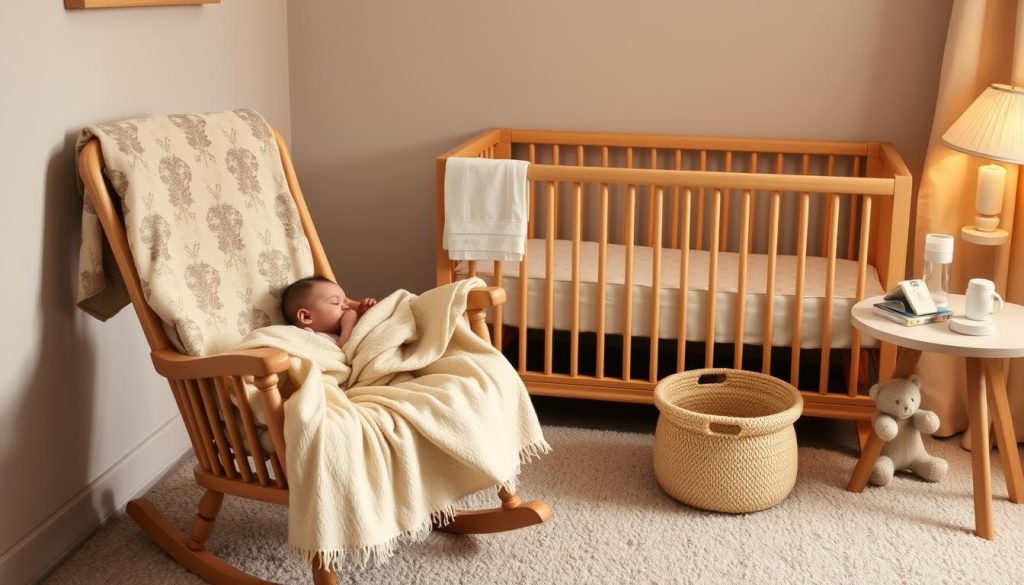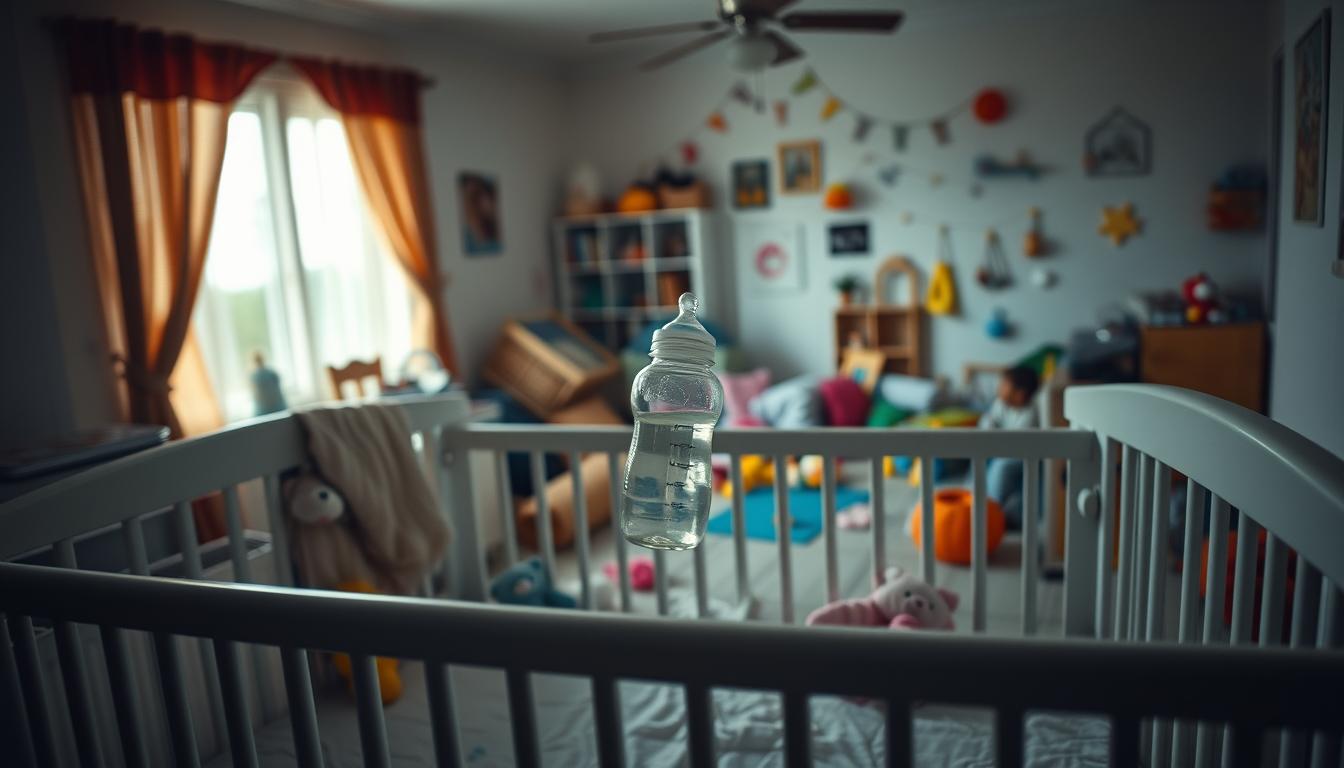Are you unknowingly putting your baby at risk during feeding times? The world is worried about Sudden Infant Death Syndrome (SIDS) and other dangers from bottle propping. Parents need to know the big risks of this practice.
Bottle propping uses cushions or blankets to hold a bottle in a baby’s mouth when they’re not there. It might seem handy for busy parents, but it’s very dangerous. This article talks about why watching your baby during meals is so important. It covers risks like choking, aspiration, suffocation, tooth decay, ear infections, and losing bonding time.
Learning about safe bottle feeding is key. The Centers for Disease Control and Prevention and the American Academy of Pediatrics have great advice. Following their guidelines helps keep your baby safe and creates a loving environment.
Key Takeaways
- Feeding newborns requires around-the-clock attention, roughly every 2 to 3 hours.
- Bottle propping significantly increases the risk of choking and aspiration, which can lead to severe health complications.
- Tooth decay and ear infections are common consequences of propped bottle feeding.
- Supervised feedings are crucial to prevent accidents and ensure the baby’s safety.
- Bottle propping can disrupt essential bonding time between parents and their infants.
What is Bottle Propping?
Bottle propping is a way to feed a baby without holding the bottle. Parents use things like blankets or pillows to hold the bottle at an angle. This lets the milk flow without them needing to be there. But, it’s not without risks.

Definition and Explanation
Bottle propping means setting a baby’s bottle at an angle so it can feed by itself. Companies make special devices for this, saying they help busy parents. But, using these devices or even blankets, can be dangerous.
The American Academy of Pediatrics (AAP) and the Centers for Disease Control and Prevention (CDC) warn against it. They say it can cause choking, aspiration, and other dangers.
Why Parents Turn to Bottle Propping
Modern parenting is full of challenges. Newborns need to eat often, up to 12 times a day, says Kids Health Organization. Parents, especially those working and caring for a baby, might see bottle propping as a quick fix.
It seems appealing when you’re trying to manage a tight budget or looking for easy ways to feed your baby. Postnatal depression and exhaustion also make parents look for shortcuts.
Many new parents feel isolated and lack support. This makes them more likely to try bottle propping, thinking it’s an easy solution.
Risks Associated with Bottle Propping
Bottle propping might seem handy for busy parents, but it’s risky. Knowing these dangers helps you keep your child safe during meals.
Choking Hazard
Choking is a big risk with bottle propping. Babies can’t control milk flow, which might cause them to inhale it. This is especially true if they stop sucking or fall asleep. So, it’s key to follow safe infant feeding practices.
Aspiration Risks
Aspiration is another big worry. Liquids going into the lungs instead of the stomach can cause infections and even hospital stays. Babies who prop feed are more at risk, making proper feeding positions very important.
Potential for Suffocation
Using pillows, blankets, or soft toys to prop bottles can lead to suffocation. These items can smother your baby, especially if they move during feeding. To keep your child safe, avoid bottle propping.

Watching over your child during meals can lower these risks. Also, cutting down on kids screen time can make these moments better. If you need help, online family therapy could offer great support.
Specific Health Complications from Bottle Propping
Bottle propping seems handy but can cause serious health issues. These problems include dental, ear infections, and missed bonding moments.

Tooth Decay and Dental Issues
Bottle propping can cause milk to pool in a baby’s mouth. This leads to tooth decay, a big problem in infancy oral health. Babies are very prone to dental issues, which can harm their teeth for life.
It also leads to feeding problems. This can affect a baby’s growth and even cause eating disorders.
Increased Risk of Ear Infections
Babies who use bottles are more likely to get ear infections. When they lie down to feed, milk can go into their Eustachian tubes. This can cause ‘glue ear,’ a serious issue.
It’s important to feed babies in a way that prevents milk from getting into their ears.
Interrupted Bonding Time
Bottle propping also disrupts bonding between a baby and their caregiver. It misses out on the emotional connection that happens during feeding. This is key for brain and emotional development.
Missing these moments can affect a child’s mental health later. Holding a baby during feeding helps create these important emotional bonds.
Parenting Challenges: Balancing Convenience and Safety
Parenting today is filled with unique challenges. The cost of living keeps going up, making it hard to afford housing, healthcare, and education. It’s no wonder some parents look for quick fixes like bottle propping. But, it’s crucial to find a balance between ease and safety.
Why Busy Parents Consider Bottle Propping
Many parents are busy with work, household chores, and coaching sports. They often feel bottle propping is a way to save time. It lets them do other things while feeding their baby. Also, keeping an eye on kids and their digital use adds to the stress.
Alternatives to Bottle Propping
There are safer ways to make feeding easier. Paced feeding is one, offering a more natural way to eat. Older kids can help with feeding, too. Planning feeding times can also help avoid the need for bottle propping. Using less plastic and choosing sustainable options is good for the planet and your family.

Expert Recommendations and Guidelines
Experts warn against bottle propping because of health risks. The American Academy of Pediatrics suggests feeding babies upright and never leaving them with a propped bottle. Teaching kids about drugs and setting limits on screen time is important. These actions help create a safe and healthy environment for kids.
Conclusion
This article has shown the dangers of bottle propping. It’s a risky practice that’s not worth the convenience. Choking hazards, dental problems, and ear infections are just a few risks. Your child’s health and safety are at stake.
Research and experts agree: your baby’s well-being is key. Human interaction during feeding is crucial. A study on father-infant interactions shows how important bonding is for development.
Safe feeding means holding your baby upright and watching for cues. Managing feeding times is also important. These steps keep your baby safe and help with bonding.
Positive parenting is vital for your child’s emotional and cognitive growth. It also helps with social media safety and reduces depression risks. By following these tips and expert advice, you can ensure a healthy and safe childhood for your child.
FAQ
What is bottle propping and why is it dangerous?
Why do some parents turn to bottle propping?
What are the choking hazards associated with bottle propping?
How does bottle propping lead to aspiration and ear infections?
Can bottle propping affect a baby’s dental health?
How does bottle propping interfere with parent-child bonding?
What are safer alternatives to bottle propping?
What do experts recommend regarding bottle feeding safety?
This post contains affiliate links. If you click on a link and make a purchase, I may earn a small commission — at no extra cost to you. Thank you for supporting this blog and helping me keep the patterns free! Read the full Affiliate Disclosure & Transparency.
